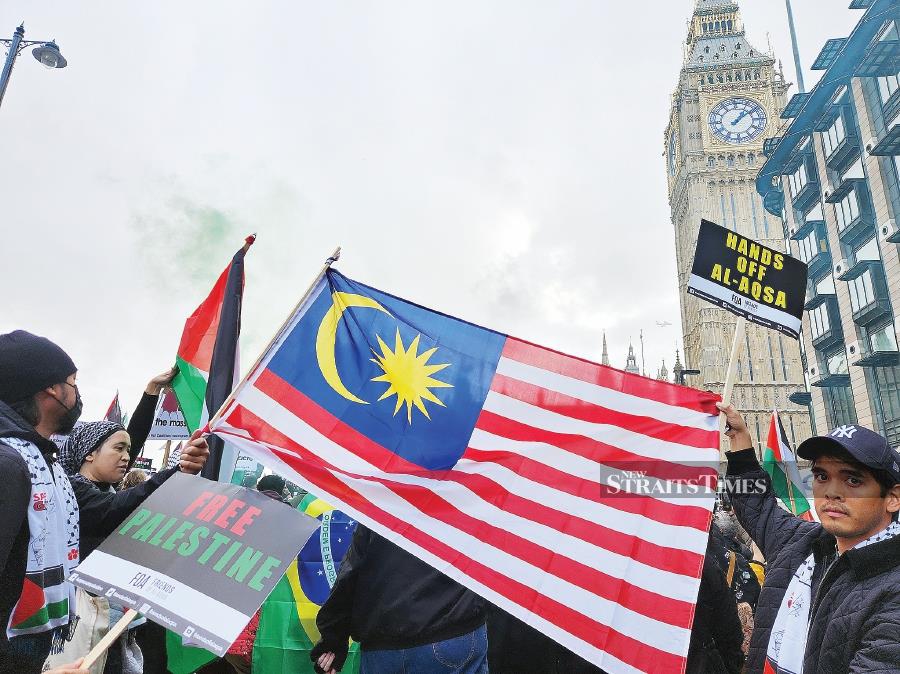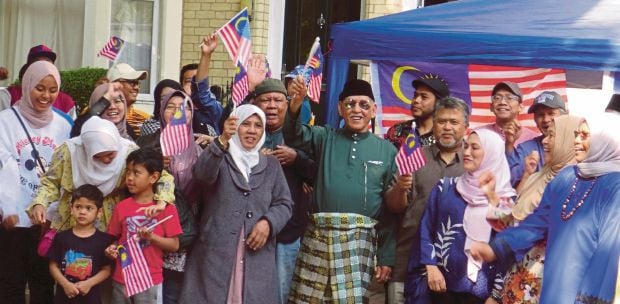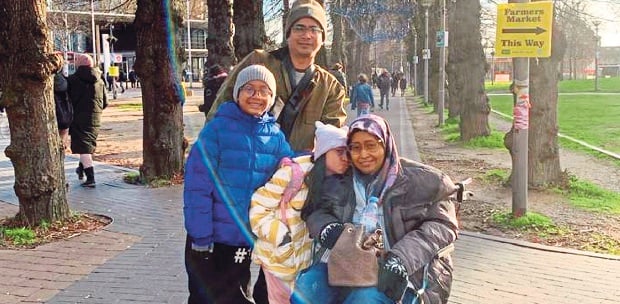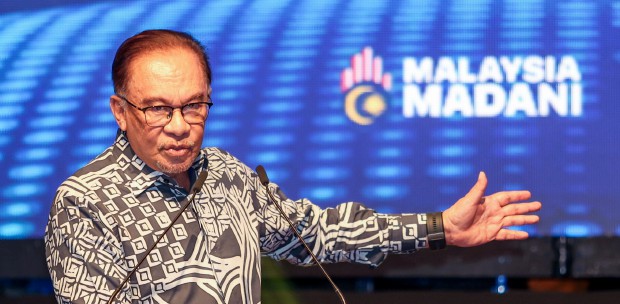AS news of the merciless battering and pounding of the Gaza Strip trickled in, signalling a blatant disregard for the outcome of the United Nations vote, the people of London took to the streets to call for an immediate ceasefire on Saturday.
With Israeli Prime Minister Benjamin Netanyahu's promise of a "long and hard war" against Hamas, it looks as if the weekend rallies will continue not only in the United Kingdom, but also in European and Middle Eastern cities, where hundreds of thousands have shown their opposition to violence and aggression.
Saturday's march from Victoria Embankment in London — passing the London Eye, Big Ben, the Parliament and across Westminster Bridge and back across the Thames on the Waterloo Bridge to Trafalgar Square and Whitehall — saw almost half a million people carrying Palestine flags and pro-Palestinian banners calling for a ceasefire and end of the genocide in Gaza, a vast increase from last week's 300,00 who turned out for the solidarity march.
The figure, of course, has been debated and disputed in media outlets.
As the saying goes, "truth is the first casualty of war". Likewise, the mainstream media chose to report on isolated incidents and arrests despite the mood being generally peaceful and organised.
The United Kingdom's history of street protests and demonstrations has largely been peaceful and well-organised, with elements of fun and entertainment added. Police officers and members of the security forces have been known to join in a jig or two. World leaders have been maligned and are subjects of funny jokes and puns by creative protesters.
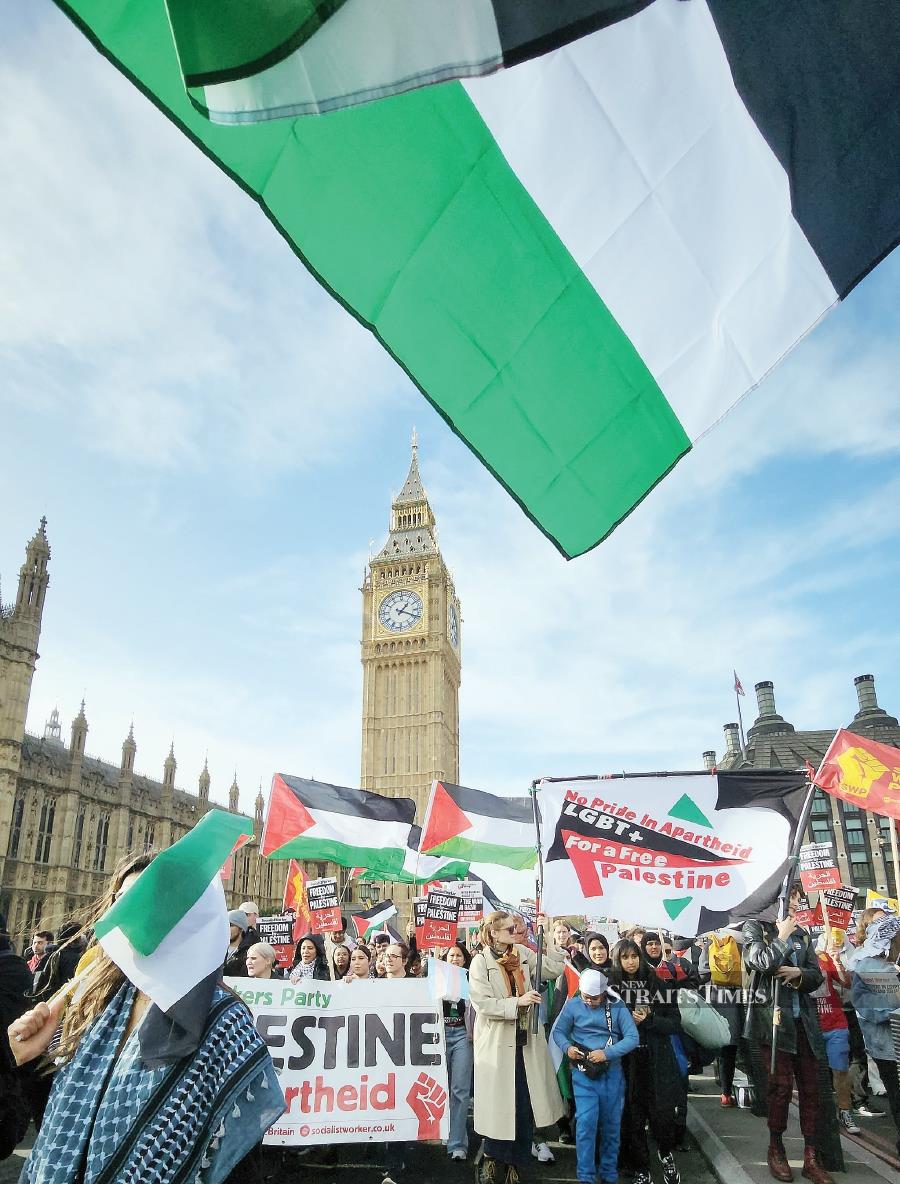
Troubles are only known to have erupted during demonstrations such as "Just Stop Oil" or "Rebellion Extinction", but normally, rallies such as these are uneventful.
However, given the UK's stance in the conflict, one becomes immediately aware of the do's and don'ts. While it is impossible to stop the flying and carrying of Palestine flags and banners, London transport police have put a stop to the posting of flags and stickers on lampposts and on any structures belonging to London Transport.
A London Transport tube driver is suspended for encouraging coachloads of marchers in the tube by chanting "Free, Free Palestine!" A video clip has gone viral showing a policeman knocking on the door of a resident who was flying a Palestine flag on his roof. This followed a complaint that some would find the flag offensive or threatening. The policeman left when the house owner obtained an admission from the policeman that flying the flag was not an offence.
However, this reminded me of the do's and don't's of one of the first pro-Palestinian rallies in Malaysia. While Malaysians abroad enjoy more freedom in voicing out our protests to get our voices heard, we were surprised that solidarity marchers were stopped from doing the takbir and had banners depicting Netanyahu confiscated.
When a hospital in the Gaza Strip was bombarded, Londoners took to the streets in an impromptu vigil and prayed in the rain in front of Downing Street.
The young imam leading the prayer sounded the azan, followed by a long doa that brought tears to many. The takbir was chanted while late evening joggers and office workers wound their way around marchers heading home.
No one not involved in the rally showed that they were offended or felt threatened.
There were reports of cries of "jihad" by protesters, and the Metropolitan Police's inaction sparked a row over whether such chants are deemed as inciting violence.
Police officers have since been allowed to intervene if protesters use the word "jihad".
Inevitably, in any rally, there would be pockets of troublemakers. In last Saturday's rally, marchers had carried bundles of white cloth smeared with red paint to represent children who became victims of the bombing. They were approached by a very drunk man who asked them to stop.
The leader of the protesters shook the man's hand and explained why they were there. The drunk man then proceeded to harass a family of marchers. This, of course, was not reported — he was after all drunk.
As in every rally, babies in prams and young children were also present.
They were brought along without any fear of the rally turning nasty. It was an educational experience about humanity and rejecting any kind of violence.
As such, I was taken aback to read that in our country, as we prepared for the Palestinian Solidarity Week in schools, there were reports on social media of teachers and students garbed in military-like gear and brandishing toy guns. The most recent clip, which had gone viral, showed a schoolteacher setting an Israeli flag on fire.
This is not the message we want to convey to the children and, more importantly, to the world.
Prime Minister Datuk Seri Anwar Ibrahim, in the recent Palestine solidarity rally in Shah Alam, gave a strong and rousing message that we must be seen to be one in our stand, in our support for Palestine and in our rejection of violence or aggression. There is no room for flippancy.
Malaysians abroad have been showing their solidarity in peaceful rallies and we are one in rejection of any kind of violence, especially to children and ordinary citizens.
We only want the long-drawn conflict to end. We also want truth to be heard. Truth is the first casualty in war, made even worse during a cyber war.
The Jalur Gemilang will continue to make its appearance in the peace rally.


